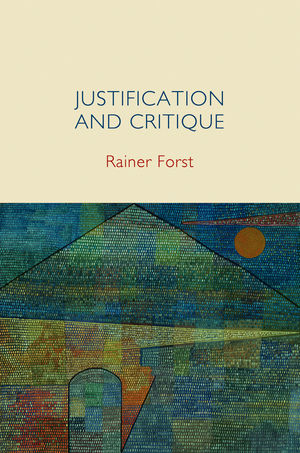With Justification and Critique, noted political theorist Rainer Forst presents a selection of essays on the limits and potential of justice. Starting from the concept of justification as a basic social practice, Forst develops a theory of political and social justice, human rights and democracy, as well as of power and of critique itself. Miranda Nell finds this an insightful and exciting read.
 Justification and Critique. Rainer Forst (trans. by Ciaran Cronin). Polity. October 2013.
Justification and Critique. Rainer Forst (trans. by Ciaran Cronin). Polity. October 2013.
This book is a series of essays (about half of which have been published elsewhere) by German political theorist Rainer Forst on the limits and potential of justice. For those unfamiliar with our author, Forst was named the “most important political philosopher of his generation” in 2012, when he was awarded the Gottfried Wilhelm Leibniz Prize. He has written widely on political theory, tolerance, and social justice, making his work a staple of many political science and philosophy reading lists.
Justification and Critique is neatly arranged into three sections of three essays apiece, beginning with more focus on justification, and ending with greater focus on critique. The book is part of the continuing debate among critical theorists about the nature of justice and includes one essay that directly responds to Axel Honneth and Nancy Fraser.
The first section concentrates on explicating and defending the basic theory Forst hopes to promote, and contains many footnotes to his earlier works while laying out important points. His aim is to continue to defend a non-consequentialist theory of justice, and the first two essays deal directly with this issue—how such a self-justifying justice could be possible without an absolute authority or an ideal realm—while the third looks at the particular example of whether peace is a condition for or a consequence of justice. Since justice is primary for Forst, he makes his case for how peace must be the result of a just society and not our first concern.
Like many contemporary thinkers, Forst wants to acknowledge the multiplicity of global viewpoints rather than making a claim to a single structure of justice. Yet at the same time, he sees the key to justice in the Kantian concept of autonomy or self-rule. The difference is that rather than relying on an ideal (or “noumenal”) notion of pure practical reason to guide this self-rule, he hopes a normative, enacted and living form can take its place.
Thus it seems we are to move from a question such as, “what is the rational ideal form of the action we ought to take?,” to one more like, “what does the actual world judge the best behavior in this scenario?” The second has the advantages of experience, multiple insight and particularity but the disadvantages of human error and worse, social pressure and powerplay. Of course, while the first may have the advantage of perfection, it also has, by most modern eyes, the disadvantage of inaccessibility or impossibility, and so normative judgment is perhaps as good as practical reason gets. The question remains as to how much stability can be expected from this, what Forst will refer to as his “in a certain sense ‘absolute’ normative anchor” (p.95), hedging against critics with qualifiers and quotation marks even in more optimistic moments.
Forst does recognize the fundamental role of power:
Power is the art of binding others through reasons… (p.11)
…the first question of justice is the question of power. For justice is not only a matter of which goods, for which reasons and in what amounts… but in particular of how these goods come into the world in the first place, and of who decides on their allocation… (p.34, italics original)
But also has confidence that through rational exchange we can at least theoretically overcome the potential inequalities of power structure:
on the spectrum of relations of power, therefore, at the one pole are situated the relation that rest on freely shared, reciprocal general reasons, and at the other those in the transitional zone which power is replaced by violence (p.11)
So long as power is mediated by discourse, justice can be served. This means that the only requirement of justice is the engagement of all parties who seek justice in the seeking of that justice, or in other words, autonomy. Several times Forst remarks on the complication (which all Kantians face) of how to account for the rights of human beings who lack full rational capacities such as children and the mentally disabled. He does not address it in detail, merely proclaiming that the norms apply to all humans and that “the passive status of having the right does not depend on its active exercise” (p.63). Why animals are not included or whether this ought to impact issues like “living wills” would be questions for a book with more interest in application than this one.
Instead, the author is focused on making the case that justice works from the ground up, starting with rational beings whose desire for justice is sufficient to supply their right to it. The essential nature of autonomy requires that all autonomous beings recognize one another as such, so that dominating behavior takes away one’s own rights in the social sphere. This importance of reciprocity and generality ultimately relies on reasonableness in the public discourse, which may be naïve and is a difficulty Forst is aware of throughout the essays (and which may seem familiar to readers of Habermas, to whom the book is dedicated).
The middle section of the book investigates some complexities and engages in deeper conversations. Concepts like dignity, redistribution and toleration are given close attention, and it is a treat to follow Forst’s careful eye as he looks at history, larger relationships and ongoing debates in detailing his view on the subjects. All along he confirms his neo-Kantian picture:
To possess human dignity means being an equal member in the realm of subjects and authorities of justification… correspondingly to act with dignity means being able to justify oneself to others… (p.101)
At the same time, he gently pulls at threads in his own theory along the way. And ultimately it is the skill with which Forst is able to display and investigate the problematic components of justice that is compelling, despite his attempts to draw at least somewhat satisfying conclusions. Relying on reason, or at least some form of rational, normative discourse, as the basis of our shared justifiable world creates a dependence on agreed forms of meaning, motivations, and explanations that humanity may simply not be able to guarantee.
And perhaps Forst agrees, as he ends the book on a series of essays focused on the elusiveness of justice, and exploring literary or critical works that challenge it. In addressing ambivalence and irony, Forst still aims to show how normativity and discourse are central, but it is clear the resulting discussions will always be full of loose ends and disagreements.
The final piece in particular calls back to such classics as Plato’s Republic and More’s Utopia, where the point was made dramatically: justice is unattainable in the human world. But while we may reference ideas of our forefathers few are comfortable accepting their style of solution, an ultimate level of reality distinct from our own in which justice is stabilized and to which we have either partial or eventual access. Without this secondary reality, of a supernatural or ideal form, we are left to create or interpret justice according to our own conversations and exchanges, and most important, there is no point at which we can acknowledge having finalized an answer or reached the truth. Instead it is constantly dependent on the input of those concerned, and will be seen as deteriorating or improving according to their viewpoints.
_______________________________________
Miranda Nell received her PhD from the New School for Social Research in 2012 and is currently teaching in Michigan. Her interests include aesthetic experience, the exploration of variety and flexibility in knowledge, and the importance of non-cognitive modes of expression. Read more reviews by Miranda.







